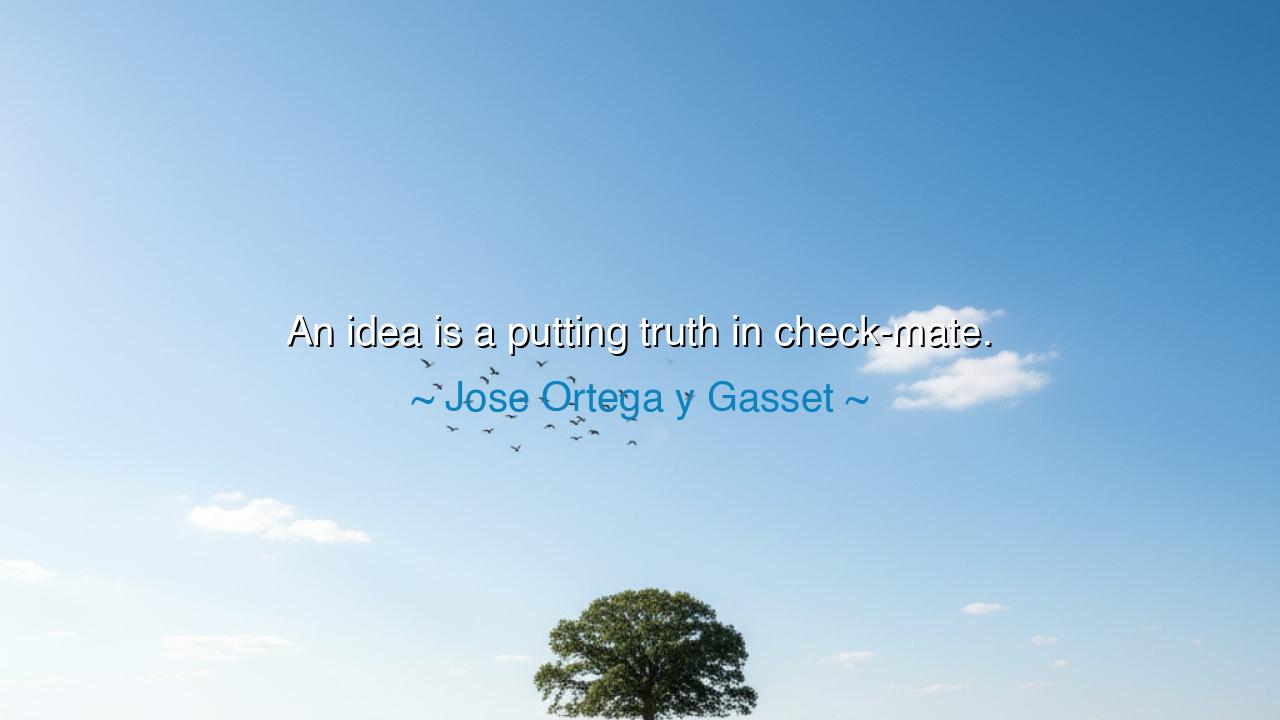
An idea is a putting truth in check-mate.






The philosopher José Ortega y Gasset, in his piercing insight, declares: “An idea is a putting truth in check-mate.” These words are not mere riddles of the intellect; they are a revelation of the eternal duel between the mind and truth—between what is known and what is real. In the quiet of this phrase lies a storm. For Ortega, every idea is a bold move upon the board of existence, an attempt by human thought to corner the vast, ungraspable truth—to trap it, to name it, to make it yield to understanding. Yet, like a master player, truth resists final capture. Each victory is temporary, each check-mate an illusion, for truth always escapes, reborn beyond the boundaries of our comprehension.
In this, Ortega speaks to the tragedy and triumph of human thought. We are seekers, restless and relentless. The moment we conceive an idea, we feel we have captured a fragment of truth, imprisoned it in language, in logic, in symbols. But truth is alive—it breathes, it changes, it mocks the rigidity of our concepts. To form an idea is to challenge truth to a game of wits; to believe too wholly in that idea is to forget that the game never truly ends. The ancients knew this. Heraclitus whispered that all is flux, and Socrates confessed his wisdom lay in knowing he knew nothing. Ortega, echoing them through centuries, reminds us that every idea is both a revelation and a limitation.
Consider the story of Galileo Galilei, the defiant astronomer who dared to move the heavens. In his time, truth was chained by doctrine; the Earth was fixed, the cosmos immutable. Galileo’s idea—that the Earth revolved around the Sun—was a move of check-mate against the accepted truth of his age. He forced men to see that what they had called truth was but a shadow upon the wall. Yet his victory, too, was not eternal. Centuries later, others would challenge even his understanding, showing that the universe was not the serene clockwork he imagined, but a restless sea of relativity and quantum mystery. Each idea topples the last, and truth forever slips one step beyond our grasp, smiling as it evades the next assault.
To put truth in check-mate, then, is both an act of power and humility. It is power, because it demands courage—to question, to think, to refuse the easy comfort of inherited belief. But it is humility, too, because one must know that every idea, no matter how luminous, will fade before the dawn of greater understanding. The wise thinker is not the one who clings to his ideas as idols, but the one who plays the game endlessly, joyfully, reverently—who loves the pursuit more than the victory. For in that endless striving, the human spirit fulfills its divine nature.
There is danger, however, when men mistake their ideas for the whole of truth. Then arrogance replaces wonder, dogma replaces dialogue, and the living search becomes a graveyard of rigid minds. History bears dark witness to this: the inquisitors who silenced discovery, the tyrants who claimed to own truth, the ideologues who built prisons in the name of purity. Each believed their idea to be the final check-mate—yet in time, truth overturned them all. For truth cannot be owned; it must be courted, pursued, and served, not dominated.
And so the lesson is clear: cherish your ideas, but wear them lightly. Let them be your tools, not your chains. Speak them with conviction, but hold them with grace. Know that every idea is a lantern—not the sun, but a flickering light that guides you for a time through the darkness. When a greater light dawns, do not mourn the fading of the old one. Rejoice that the game continues, that truth, eternal and elusive, still calls you to think, to wonder, to move again.
In your life, practice this sacred art of thinking as a living being, not as a statue of certainty. When you find yourself sure of something, pause and ask: “What if there is more?” When you hold an idea, test it not only against the comfort of agreement, but against the challenge of doubt. Seek conversation, not conquest. For only those who are willing to lose their ideas again and again can grow closer to truth. Remember, every idea is a check-mate—but truth, immortal and vast, always begins the next game.






AAdministratorAdministrator
Welcome, honored guests. Please leave a comment, we will respond soon